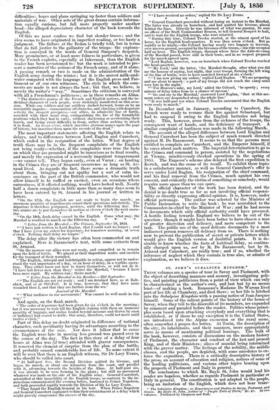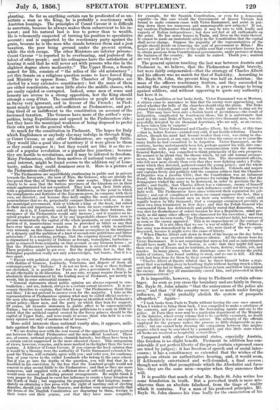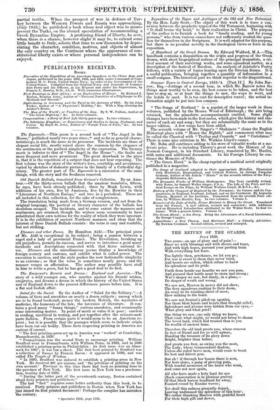ST. JOHN'S SUBALPINE KINGDOM. * THESE volumes are a species of
tour in Savoy and Piedmont, with the object of describing manners and scenery, investigating poli- tics, and. painting politicians from a point of view which can only be characterized as the author's own, and last but by no means least—of making a book. Rousseau's Madame Be Warens lived part of her life at Chambery, and died there ; so her life is hitched into the Subalpine Kingdom with a passing notice of Jean Jacques himself. Some of the salient points of the history of the house of Savoy, when they tell to the discredit of its members, are expanded by comment and paraded before the reader. Politics whose princi- ples seem based upon attacking everybody and everything that is established, or if there be any exception it is the United. States, are introduced into the Alpine excursion or the rural scene, often somewhat a propos des bottes. At Turin, the description of the city, its inhabitants, and their manners, more appropriately serve as means of mentioning political leanings. The 'bulk of the book, however, consists of discussions on the modern history of Piedmont, the character and conduct of the last and present King., and of their Ministers; slices of scandal being intermixed with the graver matter. The feelings of the nobility, the middle classes, and the people' are depicted, with some anecdotes to en- force the exposition. There is a critically descriptive history of the press, an account of education and religion, notices of some of the leading politicians, and various other topics bearing upon the propects of Piedmont and Italy in general.
The conclusions to which Mr. Bayle St. John would lead his reader are hopeless, whether as regards Piedmont in particular or Italy in general. The constitution is not adapted to the people, being an imitation of the English, which does not bear trans-
* The Subalpine Kingdom ; or Erperiences and Studies in Saroy. Piedmont, and Genoa. By Boyle St. John, Author of " Purple Tints of Parts," ife. .s.C. In two
%ninnies. Published by Chapman and Hall.
planting. So far as anything certain can be predicated of so un- certain a man as the King, he is probably a reactionary with Austrian leanings. The principles of Count Cavour it is difficult to ascertain, because he always makes them subservient to his in- terest; and. his natural lust is less to power than to wealth. He is vehemently suspected of turning his position to speculative account ; and is supported by the reactionary party against the grain, because he is the man who stands between them and a just taxation, the poor being ground under the present system, while the rich escape. The other Ministers are inferior persons: Count Cavour "is reported to be overbearing, and jealous-of the talent of other people; and his colleagues have the satisfaction of hearing it said that he will never act with persons who rise in the slightest degree above mediocrity." The Upper House a Senate named for life, consists of "the relics of the old arisiocraoy " ; yet this Senate on a religious question seems to have forced King and Ministry to oppose Rome. The Chamber of Deputies are elected by a very extensive constituency; but the mass of them are either reactionists, or men little above the middle classes, who are easily cajoled or corrupted. Indeed, some men of sense and honesty are averse to a strong opposition, lest the King should attempt a coup d'etat. The constituencies or people at large are
in Savoy very ignorant, and in favour of the French; 'Pied- mont nearly as ignorant, self-sufficient as Piedmontese, and get- ting tired of or indifferent to the constitution on account of the increased taxation. The Genoese have more of the author's sym- pathies, being Republicans and opposed to the Piedmontese rule ; but they have the municipal weakness of being disposed to prefer their own part to the general whole. So much for the constitution in Piedmont. The hopes for Italy which Englishmen or anybody else may indulge in through King, or Count Cavour, or any other Piedmontese, are equally futile. They would like.a good slice of territory if it were given to them or they could conquer it; but they would not like it as the re- sult of a popular revolution or a popular free junction; because they are hostile to revolutions, and it may be inferred to freedom. Many Piedmontese, either from motives of national vanity or per- sonal interest, might be found averse to the addition say of Lom- bardy unless they could domineer over it. Here is a picture of the Piedmontese collectively. "The Piedmontese are unjustifiably overbearing in public and in private towards the Savoyards ; the men of Nice, the Genoese, who are already far less proud than they of living under the same sceptre. They allow it too clearly to be seen that the various provinces of the kingdom are in their minds agglomerated but not equalized. They look upon their little plain, with a population not larger than that of Middlesex, as the point to which the compliments and flatteries of the European press, in company with their own, are directed ; and because they daily employ the same governmental nomenclature that we do, perpetually compare themselves with us. A sim- ple municipal government, with or without a king at the head, but suited to their size and importance, would have been far more conducive to mo- desty. As it is, if Lombardy and all Italy were to join their fortunes, the arrogance of the Piedmontese would only. increase ; and it requires no in- spired prophet to predict, that if by any improbable chance Turin were to become momentarily the capital of the whole peninsula, or any considerable portion of it, insurrections would soon be provoked as bitter as any that have ever burst out against Austria. Is it not worth while to meditate very seriously on this chance before we become accomplices in the intrigues of a dynasty and the ambition of a knot of second-rate politicians and bitter aristocrats ? It is nothing, perhaps, that the reigning dynasty of Sardinia is stigmatized by a majority of Italians as foreign, transalpine, barbarian— quite as removed from sympathy on that account as any German house ; so that the Piedmontese pretension to Italianism is received with a smile. These prejudices might be got over. But the deplorable fact is, that the Subalpme population really not only acknowledges, but boasts, that it is a race apart.
"Except with political objects clearly in view, the Piedmontese speak with disdain of Genoese, Lombards, Venetians, and dispose of them all contemptuously as 'Italians.' I do nut see how, as long as these feelings are cherished, it is possible for Turin to give a government to Italy, or to aid effectually in its liberation. At any rate, we must require them to be absolutely discountenanced by the leading men of Piedmont, not merely in words, but in some substantial manner. • • "General statements about public opinion are always exposed to con- tradiction; and are, indeed, always to a certain extent incorrect. It is ne- cessary therefore to explain, that when I say the Piedmontese think thus and thus,' I do not pretend to answer even for the majority. I take as the representatives of Piedmontese opinion what may be called official society— the men who appear before the eyes of Europe as identified with Piedmont's actual policy—these men, and the party on which they lean for support. Of course, all dynastic statesmen in public affect to be supereminently Italian ; but we must remember that these politicians to a man in 1848 in- sisted that the artificial capital created by the Savoy princes should be the capital of Upper Italy, and were ready to accuse those who held to a con- trary opinion not only of madness but of treason."
More solid interests than national vanity also, it appears, mili- tate against the fair extension of Savoy.
"We are dealing now with the real reason of the opposition I have pointed out between the official Piedmontese and the non-official Lombard. There are, of course, national prejudices, clannish hatreds ; but these have been to a certain extent suppressed in the more educated classes. This antagonism of views, however, remains, and is more marked in the higher than the lower regions. A follower of Count Cavour, if you express the hack opinion that it would be a blessing were the authority of Victor Emmanuel extended be- yond the Ticino, will certainly agree with you ; and refer you, for confirma- tion of your views to the exiled Lombards who belong to the same school. But if you go into the depths of the question you will find that he is troubled in his conviction by the fear that the 'Lombard people would not consent to play second fiddle to the Piedmontese ; and that as they are more numerous, and supplied with a sufficient dose of self-will and pride they would soon succeed in altering present arrangements. He might think it very proper for England to exert her influence to create a large kingdom in the north of Italy ; but supposing the population of that kingdom, imme- diately on obtaining a free press with the right of meeting and of electing deputies, should join with the Genoese, and declare very unequivocally that the forms of the English Constitution are disgusting to them, foreign to their tastes and their genius, and that they have more sympathy, for example' for the Spanish Constitution, or even for a democratic republic—in this case would the Government of Queen Victoria feel bound to make common cause with Victor Emmanuel, and assist in put- ting down these too numerous and unmanageable new subjects ? If not, my cautious Piedmontese friend thinks it may be wise to talk loudly and vaguely of Italian independence ; but does not feel at all enthusiastic on the point. He has many houses in Turin, and lives on the rents thereof. It cannot be made an immutable article in the Constitution that the capital shall never change. Suppose the majority of the representatives of the people should decide on removing the seat of government to Milan ? His houses are all let to members of the rabble rout that everywhere knows how to obtain pensions from Constitutional governments, under pretence of doing the business of the country. He would be ruined. Thank you ; matters are very well as they are.'
The general, opinion touchino.° the last war between Austria and Piedmont is, we believe that the Piedmontese fought bravely, but were fairly outgenerLed—that the strategy of Charles Albert and his officers was no match for that of Rruletzky. According to Mr. Bayle St. John, the present King was half an Austrian ; the mass of the officers reactionary traitors, and they succeeded in making the army treasonable too. It is a grave charge to bring against soldiers, and without appearing to quote any authority ; but hero it is.
" When hostilities at last broke forth, Victor Emmanuel was at Mortara. A citizen came to announce to him that the enemy were approaching, and asked whether the bells -of the churches should ring the alarm. The Duke abused him violently, and said that the bells ought rather to ring out for joy. This may have been only a foolish burst of peevishness—the result of indigestion, complicated by reactionary ideas; but it is unfortunate that next day the same Duke of Savoy, with twenty-two thousand men, was dis- gracefully defeated by six thousand Austrians, who are said, as an excuse, to have taken him by surprise' • •
" Between Victor Emmanuel and Charles Albert, his father, at this time —that is, before Novara—existed very cold, if not hostile relations. Charles Albert, though his mind had become weaker than ever, was rising in cha- racter. He seemed, at any rate, to wish to close his career so as to cause the many faults he had committed to be forgotten. Victor Emmanuel, on the contrary, having unfortunately been led, perhaps against his will, into com- munications with people who were in communication with the Austrian General B.adetzky, was compelled to think principally of his own prospects. He seemed to be afraid that the throne which, by our odd human arrange- ments, was his right, might escape from him. The discontented officers, who felt now more clearly than ever that they were fighting under a Parlia- ment which they detested, gathered round the young prince ; and the whole camp rang with complaints and curses of the Liberals. Colonels and majors and captains freely and publicly told the common soldiers that the Chamber of Deputies was a Jacobin Club; that the Constitution was an infamous' fraud ; that the Italian cause was a pretence for ruining Piedmont ; that the demagogues wished the army to be destroyed, in order to proclaim the Re- public; and finally, that Charles Albert was a visionary' enemy of himself and of his family. Men exposed to such influences could not be expected to fight well. The Piedmontese have since retrieved their reputation for gal- lantry; and out of compliment to them we cannot suppress the fact, that a hundred and, thirty thousand men on their own territory were easily and rapidly beaten by fifty thousand; that a campaign commenced precisely at their own tints terminated in four days ; and that the Polish General who commanded them has deliberately and publicly stated that Ramorino who was shot for disobedience of orders because he was a Republican, acted pre- cisely as did many other officers who clamoured for his execution ; and that in fact, to use his own words, The Piedmontese would not fight, but ran away as soon as the enemy appeared.' This is no impeachment of the courage of
i the nation. It not often that we see a war of soldiers.' The PiecliZon- tese army was demoralized by its officers, who were tired of the war—quite disgusted, because it might serve the cause of liberty. • • *
"When Charles Albert rode down in front of his troops on the day before the battle, he was received with ominous silence. All the shouts were for Victor Emmanuel. It is not surprising that men so led and so indoctrinated should have made haste to be beaten, in order that they might fall upon their own city of Novara and its territory, to burn, destroy, violate, rob, and murder. In many places, when the Austrians came to exercise the awful rights of victory., they found nothing to steaL and no one to kill. All that work had been done for them by their coward enemies.
"Charles Albert at Oporto related that he threw himself before a regi- ment that was rushing away in headlong flight without having struck a blow, and took off his hat to them, and begged them to turn and follow him against the enemy. But they all unanimously cursed him, and proceeded in their ignominious retreat !"
It is impossible, however, to deny to Piedmont certain advan- tages. As soon as you cross the boundary and are fairly in Savoy, Mr. Bayle St. John admits "that the annoyances of the police are over," and that "if the country were not so much under foreign
influence, it might probably abolish the system of passports altogether." Again— "I took books from Paris to Turin without having the case once opened. When I wished to bring them back, I was compelled to make a catalogue of the contents, and give one copy to the forwarding agents and one to the police. At Paris they were sent to a particular department of the Ministry of the Interior, where every volume had to be carefully examined, no doubt
i
to see whether t was of an explosive nature. The urbanity of the officials employed for the purpose makes the process as little disagreeable as pos- sible; but one cannot help drawing the comparison between this mighty empire which may be convulsed by a pamphlet, and this little state where all books are received as hospitably as travellers."
Compared with other Continental states, especially Austria, this freedom is no slight benefit. Piedmont in addition has con- siderable if not perfect liberty of the press (certain expressed cases are tried by judges) ; it has freedom of speech and. of social inter- course; it has a constituency so extended that the wishes of the people can obtain an authoritative hearing, and, it would seem, if deliberately entertained and well-founded, a final success ; though not with that promptitude which the Absolutist and Jaco- bin—they are the same men—require when they announce their will.
It is possible that much of what Mr. Bayle St. John writes has
some foundation in truth. But a perverted truth is more mis- chievous than an absolute falsehood, from the tinge of reality which it contains. For a man of his professed principles, Mr. Bayle St. John chooses his time badly for the enunciation of his liartial truths. When the prospect of war in defence of Tur- key between the Western Powers and Russia was approaching, (July 1853,) he published a book whose real object was to misre- present the Turks, on the absurd speculation of recommending ft Greek Byzantine Empire. A professing friend of liberty, he now, when there is a chance, however slight it may be, to extend some little benefit to Italy, selects that time to sow dissension by depre- ciating the Character, condition, motives, and objects of almost the only country on the Continent where the appearance of con- stitutional liberty exists or where personal independence can be enjoyed.




































 Previous page
Previous page